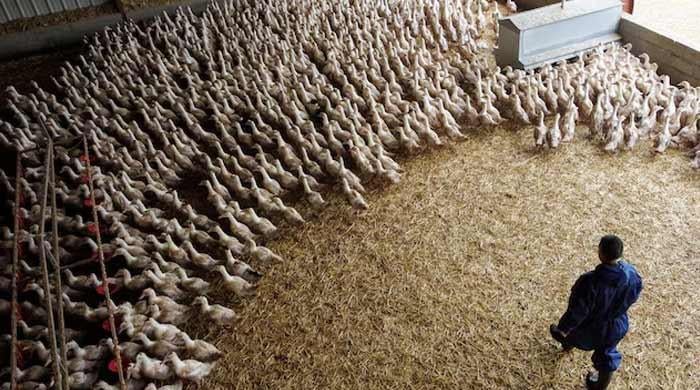Workers flee Foxconn's largest iPhone factory in China after COVID lockdown
Employees of the iPhone-making factory were seen rushing out haphazardly
October 31, 2022

BEIJING: Scores of workers at the world's largest iPhone factory in central China have fled after a COVID-19 surge shut down production and saw operator Foxconn lockdown the facility.
The Taiwanese tech giant's plant in Zhengzhou has been hit by a mass outbreak, with the company saying it is testing employees daily and keeping them in a closed loop.
Videos circulating on social media over the weekend appeared to show Foxconn employees fleeing the company's campus in Zhengzhou and returning to their hometowns on foot, in a bid to avoid COVID travel restrictions.
In one of the videos, people lift suitcases as they climb up a hillside, while another shows people sitting with their luggage by the side of a road as a person in a hazmat suit sprays what appears to be disinfectant at them.
Local governments in the area surrounding the city issued notices asking Foxconn workers to register with authorities if they returned home and to complete several days of quarantine upon arrival.
The Taiwanese firm said it was "cooperating with the government to organise personnel and vehicles" for employees who want to leave.
Foxconn has said it faces a "protracted battle" to stamp out the COVID-19 outbreak, but has not said how many of the more than 200,000 staff are affected or in isolation.
Henan province, where Zhengzhou is located, officially reported just 42 new COVID infections on Monday.
Foxconn has been accused of forcing employees who are unwell to work and not providing medical treatment or timely meals throughout the outbreak.
And China Labor Watch, a New York-based NGO, has also accused the firm of hiding the number of COVID-19 infections among its employees and forcing sick people to continue working, citing an internal message to staff as well as workers at the factory.
Foxconn on Sunday insisted that it "is making every effort" to ensure its employees are being looked after.
China is the last major economy committed to a zero-COVID strategy, persisting with snap lockdowns, mass testing and lengthy quarantines in a bid to keep infections down.
But fast-spreading virus variants have challenged that approach, with outbreaks hitting industries hard in recent months, as virus restrictions disrupt factories and curb consumer spending.









